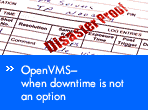HP OpenVMS Systems
Enterprise solutions
OpenVMS information
HP OpenVMS systems
Evolving business value
Related Links
HP OpenVMS virtualization
HP developed its business technology portfolio with the objective of optimizing customers' business outcomes. Companies have recognized that static information technology (IT) infrastructures deployed around the classic paradigm of disparate applications, databases, servers, and networks cannot respond quickly enough to the demands of rapidly changing business and market needs. This model is based on a "one application, one server" philosophy that is fading from popularity due to its ineffectiveness. Such IT environments are too inflexibile, and simply incapable of responding swiftly to rapidly changing business conditions, legislative initiatives, and global demands.
Flexible response to changing business and market needs requires a combination of new and existing components. Current applications must continue to be supported and the current quality of service should be maintained and, ideally, improved. In addition, vast quantities of operational data stored in disparate databases must not be compromised.
HP is leading the delivery of computing resources as services, based on a flexible, virtualized infrastructure. This approach dramatically reduces the response time required to adapt IT infrastructure to changing business and market needs. The result is superior business outcomes: lower business costs, reduced business risk, and accelerated business growth.
The information below describes how OpenVMS integrates HP virtualization technology and supports key aspects of the HP business technology solution portfolio.
Introduction
OpenVMS has a very bright future within HP because of its strong integration of HP virtualization technology and its support of the HP business technology solution portfolio. Click the tabs to find out how OpenVMS already delivers on many of the business technology solution components, and, with its comprehensive support of Web Services, ensures that existing applications and data can be utilized better and faster in response to changing business demands.
These fundamental attributes of OpenVMS will always be in great demand:
- High levels of security
- High availability and disaster tolerance through OpenVMS clustering
- Adaptability and agility through new virtualization features
- Very competitive performance on both HP Integrity servers and HP AlphaServer systems
HP will continue building upon the rock-solid foundation of the OpenVMS operating system to ensure that it better serves current and future customers as part of the HP business technology portfolio and adaptive infrastructure solutions.
Web services
Web Services is a technology that bridges the old and new paradigms, transforming long-established applications written in COBOL or Pascal into viable web services. This technology obviates the need to re-write legacy applications, ensures continued access to historic data repositories, and reduces costs by enabling new services to quickly be put into production. In addition, development in new languages such as XML, Java, and J2EE tends to be quicker than the previous generation and is capable of generating new views of the data for improved analysis and reporting.
More information about OpenVMS Web Services ›Continuous and secure operations
In 2002, OpenVMS celebrated 25 years of shipments. During this time, OpenVMS has been the industry leader in developing security, performance, and high availability capabilities.
Security
OpenVMS was designed from the outset with security built-in. As competing operating systems have discovered, it is not possible to build effective security on top of an established operating system. Security must be a fundamental and integral component of the initial design. Based on CERT Advisories, OpenVMS is the most secure, general purpose operating system on the market, surpassing more recent operating systems by two orders of magnitude.
More information about OpenVMS security ›Dynamic resource optimization
Dynamic Resource Optimization on the HP OpenVMS operating system is achieved with the new Global Workload Manager (gWLM) layered product, available on HP Integrity systems and HP AlphaServer systems.
Virtual server environment—Global Workload Manager
More information about Global Workload Manager ›
Utility pricing—Pay only for what you use
With the introduction of HP OpenVMS v8.3 for Integrity servers, which supports dual-core processors, OpenVMS introduces two new Utility Pricing offerings: Instant Capacity (iCAP) for systems that are purchased, and Pay per use (PPU) for systems that are leased through HP Finance.
Instant Capacity
iCAP provides the ability to instantly activate CPUs already installed in the chassis when demand dictates. Inactive CPUs present in the chassis are purchased at a fraction of the cost of active CPUs, and are only turned on when needed. Activation can be permanent, to cope with inexorable increases in demand, or temporary, with a temporary iCAP license (TiCAP), to ensure service level agreements (SLAs) are met in the face of expected—for instance, month end—or unexpected processing demands.
iCAP is implemented across both the HP-UX 11i and HP OpenVMS operating systems, so both operating systems can coexist in separate hard partitions on a common cell-based Integrity server. Load balancing (sharing of active CPUs between partitions to optimize the CPU utilization) can be performed manually or by Global Workload Manager.
Pay per use
For those customers that prefer to lease systems over an optional period of three or four years, PPU can dramatically reduce the cost of operations. PPU software is installed on the HP OpenVMS Integrity cell-based system, where it continuously monitors actual CPU utilization 24 x 7. This data is sent to a separate HP Proliant-based Utility Meter. Each Utility Meter can support up to 99 PPU systems on the customer network. Aggregated utilization data on each system is sent to the HP PPU Web portal over SHTTP every 24 hours; 48 hours later the customer can interrogate the portal for precise system utilization information.
The customer pays a base monthly fee, which is significantly less than the classic lease terms, plus whatever utilization has been registered by the PPU software. Customers are guaranteed that no one month will exceed 105 percent of the standard lease charge, and also that at the end of the lease, the customer will not pay more than the cost of the standard lease at full term.
PPU comes in two 'flavors':
- Active CPU—Customers turn on CPUs as required (with a minimum of one active CPU). This option is favored by ISVs, and is ideal for maintaining a warm standby system because it costs much less than traditional standby systems.
- Percent CPU—All CPUs are active at all times, with the PPU software continuously monitoring each CPU percentage utilization every ten seconds.
PPU is implemented across the HP OpenVMS, HP-UX 11i, and Windows operating systems on HP Integrity servers, so a mix of these operating systems can coexist in separate hard partitions on a common cell-based Integrity server.


